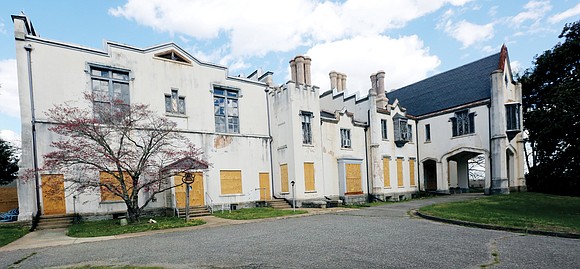Nonprofit’s effort to buy St. Emma-St. Francis property collapses
Jeremy M. Lazarus | 10/4/2018, 6 a.m.

A nearly two-year effort to protect the heritage of a sprawling Powhatan County site that was the home of two African-American Catholic boarding schools has collapsed.
At the last minute, a key funding source, which the Free Press has identified as the Virginia Conservation Legacy Fund of Roanoke, pulled out of a deal that would have allowed the nonprofit Belmead on the James Inc. to purchase and keep the 2,265-acre property as a cultural and conservation site along the James River.
The site’s rich history includes the 70 years that it served as home to two celebrated Catholic schools for African-American youths, St. Emma Military Academy for boys and the St. Francis de Sales School for Girls.
Both schools closed in the early 1970s, and only the historic mansion, Belmead, remains.
In a public statement announcing the deal’s collapse, Dr. Demetrius Venable, a Howard University physics professor who serves as president of the nonprofit, called it “imperative that we immediately identify lenders who will help us purchase Belmead before it is sold to a buyer who might not share our goal of preserving this unique property.”
Joe Elton, vice president of Belmead on the James, confirmed in an interview that the group had expected to wrap up the purchase of the property in September from the Philadelphia-based Sisters of the Blessed Sacrament.
Instead, Mr. Elton, retired director of Virginia’s state parks, said the expected funding became unavailable.
“It’s disappointing,” Mr. Elton said. “But we are not giving up. We are now searching for new sources of funds, including contributions from the 4,000 members of our organization. We’re hoping the sisters will give us 90 more days to try to make this happen before turning to other buyers.”
The Sisters of the Blessed Sacrament religious order was started in 1891 by now Saint Katharine Drexel, an heiress who used her family’s fortune to open schools for Native Americans and African-Americans. St. Francis and St. Emma, which were started in the 1890s, were a part of that effort.
The order, which is declining in numbers as the nuns age, did not respond to a request for comment, nor did the Chicago real estate firm that has been handling the sale since the property went on the market in 2016.
Members of the order lived on the property even after the schools closed, with the last three nuns leaving in 2017 as leaders of the order began entertaining offers.
At the time, the order stated that the decision to sell was made to avoid paying additional costs for maintenance and to boost funds to care for elderly nuns in the order, along with support for the order’s schools still open.
Nearly half the Powhatan County property is protected under a conservation easement, but about 1,200 acres could be used for construction of homes, apartments or office space.
However, despite a plethora of offers from developers eager to subdivide the land, the order ended up accepting the offer from Belmead on the James, based on assurances that the money would be available.
While Mr. Elton would not talk about the specific price his organization offered, the county appraises the site at $7.3 million for tax purposes; indications have been that the Sisters of the Blessed Sacrament wanted at least that much.
Since inking the purchase agreement, Mr. Elton said Belmead has raised about $1 million in grants from government and private conservation sources and was continuing to seek other grants.
The group also had secured a promise from a supposedly deep-pocket nonprofit fund that is involved with conservation. While Mr. Elton declined to offer any details, others with knowledge said that the Legacy Fund had agreed to cover the cost of the purchase and allow Belmead to repay what essentially would be a loan over a series of years.
Mr. Elton would not identify that funding source, but the Free Press has been told by several supporters of Belmead’s purchase that the Roanoke-based Legacy Fund, led by wealthy businessman Tom Clarke, made the promise, but could not come up with the money when the sale was to be completed.
Neither Mr. Clarke nor the staff at the Legacy Fund’s office could be reached for comment.






